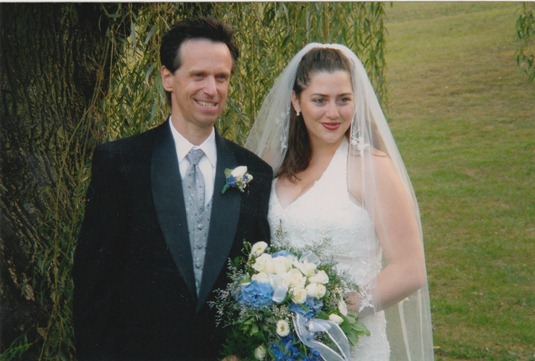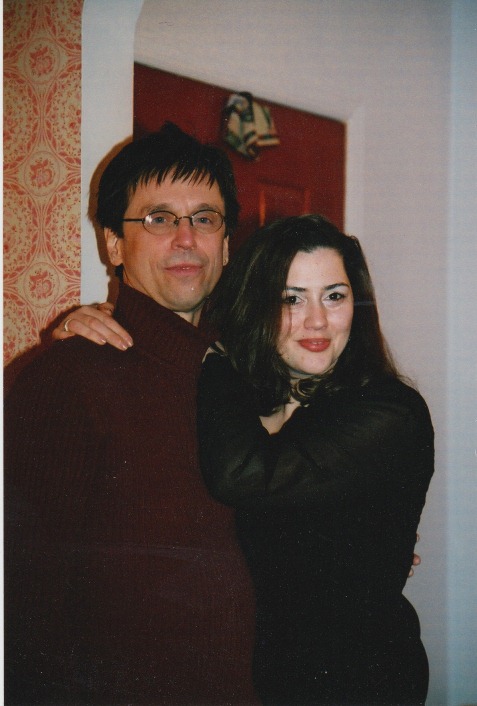 Their love of music brought them together. LeeAnne and Stanley Whitaker were married in 2005, and the duo has literally been making beautiful music together ever since. Today they live in Maryland, just north of Baltimore, in a lovely, petite farm home, built in 1817, with old weeping willow trees and a pond. More than anyone, LeeAnne has shared Stanley’s Triumphs and Disasters.
Their love of music brought them together. LeeAnne and Stanley Whitaker were married in 2005, and the duo has literally been making beautiful music together ever since. Today they live in Maryland, just north of Baltimore, in a lovely, petite farm home, built in 1817, with old weeping willow trees and a pond. More than anyone, LeeAnne has shared Stanley’s Triumphs and Disasters.
ATI: We all want to know how you met Stan.
LW: I was beginning to experiment with my voice in around late ‘97, and I wanted to go off the beaten path to study from people in modern rock or progressive rock, because it was a little bit edgier, a little bit more musical. I was in this little progressive modern rock band, and we needed a guitar player because the band started getting more dates. Our regular guitarist had a full calendar and couldn’t play weekends, so I got Stanley’s number from someone who knew him and said Stanley had just started doing solo work and was looking for more work.
I said, “Cool. He’s interested in musical work and interesting chords, and he’d be perfect to do this. Tell me all about him.” And he said, “He’s a really good player and a really interesting, excellent musician”, so I said, “Perhaps he’d be bored with this.” He was sure Stanley wouldn’t be and he was looking for work; He was really struggling, reinventing himself and getting his equilibrium after he came back from LA. He was open to trying all sorts of things.
I called him with the set list and he said, “Oh, I love that song! Oh, I love that song! Oh, I love that song!” The first time I met him was when we did this gig together. After our first show, I said I’d like to do this better and asked if I could meet with him and talk, and he said yeah, yeah, yeah. I went over, walked into his house, and it was like meeting like a quirky, little Johnny Depp sort of fellow—like nightmare before Christmas.
It was just so fun. His home was busy and full of things, and everything was interesting and had a story to it. But I’m thinking, “LeeAnne, you’re a woman, and you’re going to this person’s home. It’s a man. He’s not married. There are no children. Be careful. You don’t want to be the story that makes the police blotter—a woman goes to learn harmony parts and becomes a statistic.
There was something about Stanley that made me feel I would be safe there. We went to his studio, put headphones on and started listening to each other’s voice. He did “Crash” by Dave Matthews Band, and it was an incredible voice that came through.
ATI: What did you think the first time you heard him play?
LW: It was the voice that blew me away. It was the voice that was so obvious; people would turn in their chairs. That was the thing that blew me away. And his guitar tone was incredible.
ATI: What made you fall in love with him?
LW: That. Just that. The first song I sang in front of him—he says he doesn’t remember, which is really funny—was a song called “Torn” by Natalie Imbruglia. I finished the song and he said, “Wow.” It was just cute and sweet and pure. There’s a very youthful, open tenderness about him. I have always been a veracious student without endless dollars for education, so I’ve always audited classes or partnered myself with people who are teachers and far better than I. He was one of those people. Here’s this wonderful fellow, so tender and kind, and he’s also willing to teach me things. He’s unique that way.
ATI: Describe how Stanley relates to the world.
LW: He’s absolutely influenced by his mother. She was a naturalist with a very quirky sense of humor and a quirky view of the world, which is a wonderful thing. Stanley got a lot of that, but he’s definitely an inward person. On the Myers Briggs test, he falls on the introvert side. I fall dead center between introvert and extrovert. He’s very introverted and probably has three hours of stamina for anything, because his activities are very introspective, very inward. He likes video gaming.
ATI: Really?
LW: Yeah. He is such a gamer and stays up to date on the technology with the kids. It’s hilarious. He’s got “street cred”. Stanley waltzes up to a gaming system in Best Buy or wherever, and the kids start hovering around Stanley, because here’s this old guy playing these games, and they’re tickled pink—they think he’s old, but he is so cool.
He plays on a PlayStation 3. He knows about various [game designers] and who writes games for what systems. He has everything from Japanese games to games like Flow, a beautiful game that he enjoys. He also has straight-up games like “Mass Effect 3” and “Rage”. He has this very tender, young spirit that’s quite childlike, and he’s down there playing these games with these God-awful names. So as I go upstairs with my book, I say to him, “Thank you for saving the world.” That’s our big laugh.
ATI: He wants to stay relevant. We can understand that.
LW: Absolutely. With music, he continues to stay a student, and he adores guitarists Tommy Emmanuel and Guthrie Govan. He’s constantly studying, very much like me. We’re always in the books or on the computer. Otherwise, dig a hole, right? With his illness, his job is “be here and stay creative, stay feeling vital.” He does it beautifully; he works the balance quite well. My job is “I love you.”
ATI: You just mentioned his illness, and you probably saved his life when you urged him to see a doctor about his throat. Tell us about that ordeal, how you handled it and how Stan faced it?
LW: There was something wrong early on when I met him in one of those sessions where we worked on vocals and harmonies. We sat Indian-style on the floor of his little studio, and we worked on the harmony parts together knee to knee. I saw this lump on is throat, asked about it, and he said, “Oh, I’ve been singing a lot.”
 I had just gotten my tonsils out at thirty years old, so I knew what a swollen tonsil was, and that wasn’t it. But I’ve just met this man, and I assume he knows his body better than I do.
I had just gotten my tonsils out at thirty years old, so I knew what a swollen tonsil was, and that wasn’t it. But I’ve just met this man, and I assume he knows his body better than I do.
Then we started dating. We’re sitting on the couch, eating pizza, Indian food, whatever, and I said “You know, that’s not looking good. Something’s wrong.” Stan would touch it and go, “Oh, that’s nothing.”
Fast-forward to years later. We’re now married, sitting on the couch watching a film. We love film. I’m always seated to his left, and I see this thing in his throat just below the jaw line, and I said, “You know, that’s changing shape. It looks different to me.” He was, like, “Nope, nope, nope.”
Then Fred Brown, his friend he’s known since age 15 in Germany, called and said, “I have esophageal cancer.” I’m in kitchen slicing cheese or something, and I come in just after he’s hung up the phone with Fred. Thankfully, I get my matter-of-fact sense of humor from my mother, so I said, “Okay, honey. Exactly what size of a building is it that you’ll need me to have come down on both your shoulders for you to go get this thing checked out? I did that gentle nudging for years, and then one person becomes a catalyst, and it was Fred Brown.
Fred and I shared a fine rapport, and we talked Asian studies a lot together. Fred was half Asian and half African-American, a lovely man, and he died a after a terrible fight [with the disease]. Stanley did his eulogy, and it was devastating.
ATI: But it lit a fire under him. How did the diagnosis affect you?
LW: Ours was a very young marriage. We got married in 2005, and we struggled financially daily. He’d had back surgery for a serious injury, so I was carrying the PA to gigs. The cancer came in June of 2008. We walked into cancer with no health insurance.
ATI: Ouch!
LW: We worked together, so my income was dependent on him and his income was dependent on me. Holy Mother of God. I go into “strategy” mode—let me study, let me see what’s around. Finally, I was able to get a care program that wouldn’t turn him down for a pre-existing condition. Thank God for that.
Maryland Health Insurance Program accepted him, but the bills were still astronomical. Doctors said this could be in excess of one million dollars in care, because the leukemia is chronic. He’ll deal with this the rest of his life. It’s a rare form of cancer that tracks nerve endings and, apparently, these little buggers like to attach to other organs. Thank goodness, he’s in a state of remission now. Meanwhile, there’s a lot of “how are we going to do this and get him the best care?”
Then, in November of 2009, we had a wonderful benefit where the community really stood behind Stanley. It was incredible. It was a six-hour event, and the Baltimore School of Rock opened up for us. I started an organization called Moon Out Loud, to build a bridge between our youth and our mentors, our elders, so it was important for me to have the children there; these children learned and sang a progressive rock song, which was extremely difficult. Apparently, because it was for Stanley, they even had their parents bring them in on weekends to learn this very difficult piece. It was a wonderful day of friends, food, and the folks could even watch football if they wanted. It probably was the best day of my life—to know that this community was going to stand for him. We called the event “Stand for Stanley.” It was wonderful.
ATI: What was Stanley’s attitude as he went through this ordeal?
LW: First we sat together, then lay on our bed, held hands and cried really hard. We “watered the flowers” of our relationship, because that was on our wedding invitation. There was panic, of course, but then we went right into “how are we going to make this and do it right?” Stanley went inward.
He kept working with Oblivion Sun. It was important to make those rehearsals. He’d make goals and see how he did. The big goal was to perform at his benefit concert. He wrote music in his head, and then we would record it. He wrote the “March of the Mushroom Man” while driving in the car to and from his radiation appointments. He had thirty-six radiation treatments to the head and neck, which is the most extensive they’ll do. He wrote this music, and he performed it at the benefit. It was just brilliant.
ATI: Describe a typical evening at home with LeeAnne and Stan?
 LW: For ten years, a typical evening with Stan and LeeAnne would be playing music for people. If we’re staying at home, it would be a simple meal on the healthy side of things—definitely more green on the plate. We’re working out healthy ways to include the antioxidants and cancer fighters, so we may make something simple, fish and a small starch and heavy vegetable. Then we’ll watch “Leave It to Beaver” or some black-and-white sitcom and maybe a film. Sometimes, Stan and I will watch a film together, or he’ll watch a film while I work on my messages and my business mail and that sort of thing. We really enjoy our quiet. Then we go to sleep.
LW: For ten years, a typical evening with Stan and LeeAnne would be playing music for people. If we’re staying at home, it would be a simple meal on the healthy side of things—definitely more green on the plate. We’re working out healthy ways to include the antioxidants and cancer fighters, so we may make something simple, fish and a small starch and heavy vegetable. Then we’ll watch “Leave It to Beaver” or some black-and-white sitcom and maybe a film. Sometimes, Stan and I will watch a film together, or he’ll watch a film while I work on my messages and my business mail and that sort of thing. We really enjoy our quiet. Then we go to sleep.
I’m giggling because it’s funny how simple we are. I’ll go outside, do some writing and look up at the stars. Sometimes I can get him to come outside with me, but not very often. He gets cold quickly, and we’re sort of opposite that way. He’ll do a massage in his therapy chair, because it gels well with the nervous system, spinal cord and muscles—the chair is great for him.
ATI: What is Stan’s approach to day-to-day living in this point in time?
LW: Right now, he’s studying engineering of music—text books, master classes, continuing studies in certain areas of recording. We need to exist, and we’re very aware that his health isn’t getting better, so the goal is for him to be able to work at home using his gifts. The physical energy is just not there. His approach is about balance and not squandering the gift of time. “What am I going to include in my day?” He does make sure he laughs really hard every day, staying up to speed on the edge of comedy. I hear him downstairs giggling, and it’s a present to me, because I’ll be up in bed rosy-cozy reading something, and he’s right underneath. That’s fuel.
We have walkie talkies, too, which is really cute. If he needs anything, he calls me, and I can dash down and help him. He likes to do stretching and yoga. He doesn’t have the energy for a lot of cardio, although I do nudge him a lot to get him outdoors. We have a horse [Pippin, an Irish thoroughbred] boarded close by that was gifted to Moon Out Loud. Sometimes I can get him to go to the farm and brush the horse. The horse is truly holistic fuel for both of us. I’ll get him out to do some gardening, even if it’s just for twenty minutes. For Stan, it’s a mix of music and gaming and laughing, just staying creative and vital—the fuel to keep moving.
ATI: You know Stanley better than anybody. What would you like to have the people who are going to read this retrospective know about Stanley?
LW: What I would want people to know about Stanley is that he is a pure steward of his instrument. He continues to study guitar and continues to focus on the dimension of his voice. He has such a devotion to this life and this craft and being a steward of his instrument. He has a brilliant voice. But that doesn’t always pay the rent.
Yes, he’s exacting and, yes, he’s directive and, yes, he knows what he wants, and he can be extremely difficult. And he is so devoted, so if he’s singing some incredible songs, and you walk by his tip jar, drop in a dollar or write a smiley face on the back of your receipt and drop that in. We would like to keep him for as long as we can.

Much gratitude to all involved in this project.
Best to you and yours,
LeeAnne Whitaker
Moon Out Loud
It was entirely our pleasure, LeeAnne!